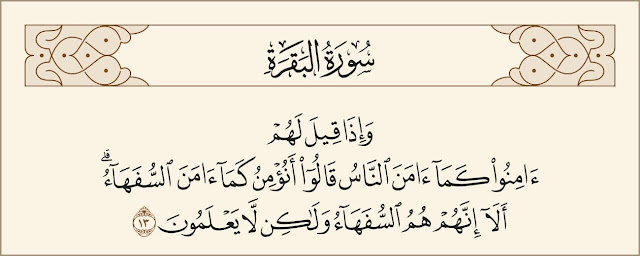Tafseer Surah Baqarah Verse 13 | Surah Baqarah explanation in English | Surah Baqarah explained | Surah Baqarah Ayat 13
Tafseer Surah Baqarah Verse 13 | Surah Baqarah explanation in English | Surah Baqarah explained | Surah Baqarah Ayat 13 Translation
Surah Al-Baqarah
Verse 13
He (the Most-High) said:
﴿ وَإِذَا قِيلَ لَهُمْ آمِنُوا كَمَا آمَنَ النَّاسُ قَالُوا أَنُؤْمِنُ كَمَا آمَنَ السُّفَهَاءُ أَلَا إِنَّهُمْ هُمُ السُّفَهَاءُ وَلَـٰكِن لَّا يَعْلَمُونَ ﴾
📜 And when it is said to them, "Believe as the people have believed," they say, "Should we believe as the foolish have believed?" Unquestionably, it is they who are the foolish, but they know [it] not (Al-Baqarah 2:13)
 |
| Surah Baqarah Verse 13 |
📚Meaning: If the Messenger or the believers said to them, “Believe” – in other words, complete your īmān by having true belief along with deeds you’ve forsaken – which are righteous deeds – just as the people you know from the people of īmān and certainty have believed, meaning the Ṣaḥābah. The alif (ا) and lām (ل) in al-nās (النَّاس – the people, using the definite article), implying those with complete humanity (who) act according to what Allāh has gifted them from mobility and reason, acting according to the purifying legislations that have come to protect the welfare of humankind, and repel from them evil and harm. Meaning: believe like the belief of the Ṣaḥābah, for in truth, they are the ones who are complete.
📚 And the answer of the munāfiqīn was, “Should we believe as the foolish have believed?” This is from their tyranny and arrogance. Sufahā’ (foolish) is the plural (in Arabic) for safīh (fool), and the fool is the one who is weak in opinion, ignorant, with little knowledge concerning benefit and harm.
📚 Foolishness is feeble and absurd opinions dictated by a lack of reason. This is how wicked people describe the people of goodness, with evil descriptions to camouflage their own faults.
📚 This noble āyah contains a diversion for the Messenger, scholars, and callers (to Islām) in order to be patient with that which they face in their calling to Allāh.
📚 So the meaning of the āyah is: If it is said to the munāfiqīn, “Believe in that which was revealed to the Prophet (ﷺ), and act according to that which you believe in and what has come down from the two revelations (i.e., the Qur’ān and the sunnah),” they said, “Should we believe in that which the ignorant believe?” So then Allāh controverted them and judged them to be the ignorant ones in reality.
📚 This is because the ignorant is called foolish, since he loses whatever he thinks he has memorized. Similarly, the munāfiq disobeys his Lord in whatever he sees himself as being obedient to Him in, and (in actuality) disbelieves in whatever he thinks he is believing in.
📚 And the statement of the hypocrites, “Should we believe as the foolish have believed?” then they used to say this in concealment and mockery.
📚 Allāh allowed His Prophet and the believers to be aware of this, and true foolishness lies within the hypocrites, those who did not establish sincerity with their Lord, so there will be no salvation for them from the punishment of Allāh.
📚 And Allāh refuted them with His statement: Unquestionably, it is they who are the foolish, but they know [it] not. Meaning, due to their complete ignorance, they do not know their state of misguidance and ignorance; increasing their ignorance and incursion into evil, while distancing them from the guidance.
📚 The previous āyah concluded with: “But they perceive [it] not,” and this āyah with, “but they know [it] not.” Corruption on the earth is a physical matter that humankind perceives with his senses and feelings. As for foolishness, then it is a non-physical matter, whose effects are perceived by humankind after looking and reflecting on thoughts; so knowledge appropriates to it.
📚 This noble āyah, and the one before it, gathers what is incumbent upon every Muslim to do, for completeness of īmān comes with the combination of the two matters:
☀️ Firstly: Turning away from all that is obligated to turn away from, and this is what is implied with His statement: “Do not cause corruption.”
☀️ Secondly: Fulfilling that which is obligated to perform. This is what is being sought with His statement: “Believe.”
🔮Reflection/Ponder Point
Allah SWT started with the prohibition against misdeeds and (acts of) disobedience.
Then He followed this with the command to believe to return to him, to residence in everlasting bliss.
Repelling corruption takes precedence over bringing about benefit.
Salvation comes with being saved from that which is forbidden/frightening and attaining what is demanded.















No comments:
Post a Comment